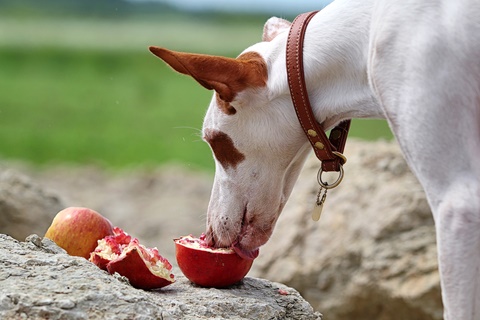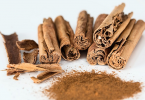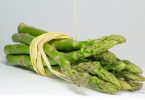Today’s question: can dogs eat pomegranate? Is pomegranate good or bad for dogs? Scroll down for detailed answers.
The diet of dog’s has begun to evolve from one that is simply made up of dog food such as kibble, wet food, and dog treats. Many dog owners wish to feed their dog foods that they themselves enjoy and foods that they have on hand. Incorporating fruits and veggies into the diet of your dog can be easy for you if you have these foods on hand already! Adding vitamins and nutrients to the diet of your dog may seem to be just as an important task as adding the nutrients into your own diet.
Should dogs eat fruits or veggies? Which do they enjoy the most and seem to benefit from? Dogs seem to like sweet foods, especially since their dog food is a bit bland and meaty flavored. Pomegranate is a luxurious frit enjoyed by many, and with a powerful resource of nutrients. May we offer pomegranate to our dogs without risk of potential harm to their health? Can dogs eat pomegranate?
Can Dogs Eat Pomegranate?
The answer is a definite yes! Pomegranate is a delicious fruit and it is a perfectly safe food for your dog.
The pomegranate is nutritious and high in nutrient content, including vitamin C, folic acid, fiber and potassium. Pomegranate is low in calorie and high in antioxidants. You can feed your dog pomegranate in fruit or juice form. You may also puree pomegranate or mush into a cream like substance and mix in with the dog kibble you normally serve. However you choose to offer this fruit to your dog is one in which your dog will benefit.
The fiber content of a pomegranate will help keep your dog regular and without a harmful buildup of toxins. Many dog owners are unaware that their pup can benefit from added vitamin C just as their owners can. Vitamin C is shown to reduce the onset of a cold and boost overall immunity. Dogs get sick just as people do, and dogs may be more at risk for sickness due to the fact they stick their noses and mouths into most anything. Germs enter the nose and mouth and invade the body. Dogs use their nose and mouth to smell and taste all things, thereby raising their risk for sickness. Using foods like pomegranates that are rich in antioxidants and vitamin C may help reduce the risk of sickness in your pet and possible reduce their risk for disease as well.
Based on common knowledge, there are several benefits of feeding your dog pomegranate. While every food has a benefit, most foods seem to have a drawback. Depending upon who you ask, pomegranates may be the best food to feed your dog. However, there is group of professionals who seem to believe that pomegranate is not good for your pet dog. I will give you both sides of the story on the safety of pomegranate and let you determine whether you would like to feed this fruit to your dog.
Health Benefits of Pomegranate
Rich nutrient content
Research studies have been carried out to establish the utility of pomegranate for dogs, and the initial findings are that pomegranate has rich vitamin C content which is good for your dog’s health. Pomegranate has a moderate amount of calories, 83 in 100 g of fruit, which is only a little more than the calories found in apples.
There are no saturated fats or cholesterol. Ellagitannin compounds like Punicalagin and Granatin B are present in abundant quantities. Research indicates that these elements help in decreasing the risk of heart disease by removing harmful substances from the body.
Anytime you are able to feed your dog a food meant for human consumption that is also beneficial top your dog, you should. This fruit has so much to offer in such a little bite, that occasional feedings to your dog should be considered a good thing. Dogs should not eat human food all the time, but when able to do so safely, a small boost of added vitamins and nutrients is usually a good thing to consider.
The low caloric content, lack of saturated fat, and lack of cholesterol allow the pomegranate to be a safe treat alternative for your pooch. For example, if you must choose between bacon and pomegranate, the fruit will be deemed a healthy alternative! Bacon is a fatty piece of junk food that is greasy, high in fat and calories, and can cause heart issues. In comparison, pomegranate has the exact opposite effect on your dog.
Useful antioxidants
Additionally, the initial research suggests that the antioxidants found in the fruit may act as a preventive element against some cancers. However, as this information is based on preliminary findings and further research is essential to establish its validity beyond any doubt. Using fruit and natural vitamins to prevent cancer is a time old measure for both animals and humans.
Those who wish to prevent this deadly disease do so in the only way in which there are able-through diets. Whether this method works or not is up for debate, but adding the foods rich in antioxidants surely will not hurt you or your dog in the process.
Very healthy treats
In small amounts, pomegranate is a very healthy treat for your dog. It is surely very advantageous for your dog to enjoy this healthy fruit. Just be careful to use it in limited quantity. Dogs do not need to consume foods meant to be eaten by humans. When choosing to offer human foods to your dog for consumption, you must take into account that their digestive system differs from their owners and they cannot digest the foods as well as we can. Small amounts of pomegranate, and on occasion only, is a good treat. However, the food should not be incorporated into their everyday diet.
Dog food manufacturers that produce foods based upon the nutrient foundation of the pomegranate may be a safe food to offer your dog as well. You do not need to have the pomegranates on hand for your dog to eat if you do not eat the fruit yourself. You also have the safe notion that if the food was prepared for dog consumption, the food should be without risk to your pet. Biscuits made of pomegranate may also be easier for your dog to take, easier to serve, be more portable, and stay fresher longer.
Save your dog from processed snacks
Hundreds of incidents of pet illnesses are caused by processed snacks. They contain ingredients that are considered unsuitable for people’s consumption due to high levels of permitted toxic substances. We need to review all the foods that we feed our pets and switch towards human-grade and whole-food based standards.
Among the healthy foods that you enjoy, there are many that your pet will too and are safe for it. Pomegranate is one of these that can be fed to your dog in moderate amounts. The fresher the pomegranate, the better. The more natural of a state the pomegranate is, the better as well. Buying fresh foods from a local, organic farmer may be the safest method in which to offer this fruit.
Pomegranate juice is an ingredient in dog supplements
Another factor that supports the benefits of pomegranate for dogs is the presence of pomegranate juice in antioxidant supplements for dogs. They usually contain juice from other berries too, so probably pomegranate juice needs to be supplemented by other juices. Even then, it is safe to presume that the research conducted in creating this supplement concoction lead to the conclusion that pomegranate juice is good for dogs.
No life-threatening effects
The Punica species, commonly known as pomegranate may never be the reason for serious damage to your dog’s health. If there is any negative impact on its gastrointestinal system, it will gradually adjust to eating this fruit. These temporary symptoms will ultimately go away.
Disadvantages of Feeding your Dog Pomegranate
Possibly causes gastrointestinal problems
Pomegranate is not likely to cause serious harm to your dog’s health. However, there is a possibility that it may lead to gastrointestinal problems in your dog. This is more likely to occur if you feed your dog large quantities of the fruit.
Limited health benefits for dogs
It is believed that the high anti-oxidant content in pomegranate is not very effective for dogs as the benefits of this fruit are not translated very effectively. Even if they seem to eat the fruit very eagerly, the nervous system of a dog does not gain the advantages that a human being does.
How to Start Feeding your Dog Pomegranate
Fresh fruit seeds
You can start off by dropping a few seeds of a pomegranate onto the floor and see how your dog reacts. There is a good possibility that it will love it and finish it up in an instant. You may need to watch your dog very carefully for a few hours to see if the pomegranate makes it sick. If everything is okay and there are no symptoms of gastrointestinal issues, you may make pomegranate a regular feature of your dog’s diet.
Mashed pomegranate
The exotic fruit is mostly filled with seeds that can cause blockages in your dog’s intestines. To avoid any discomfort to your pet, you could mash the seeds and pulp and feed your dog a spoonful.
Use small amounts
Remember, that too much of any new food may lead to digestive problems in your dog and should be avoided. In this case, the disadvantages may outweigh the benefits. A few dried pomegranate seeds, a spoonful of mashed pomegranate or handful of fresh fruit seeds will be a cause for delight for your dog at any time.
Before you decide to add pomegranate juice to your precious pet’s diet, ask your holistic veterinarian or pet nutritionist if this is right for your dog.
References:
http://moderndogmagazine.com/articles/10-human-foods-share/17297
http://dogzenden.blogspot.com/2010/04/is-pomegranate-good-for-dogs.html
http://www.aspca.org/about-us/faq/acai-berry-and-pomegranate-0
http://nutritiondata.self.com/facts/fruits-and-fruit-juices/2038/2









Leave a Comment